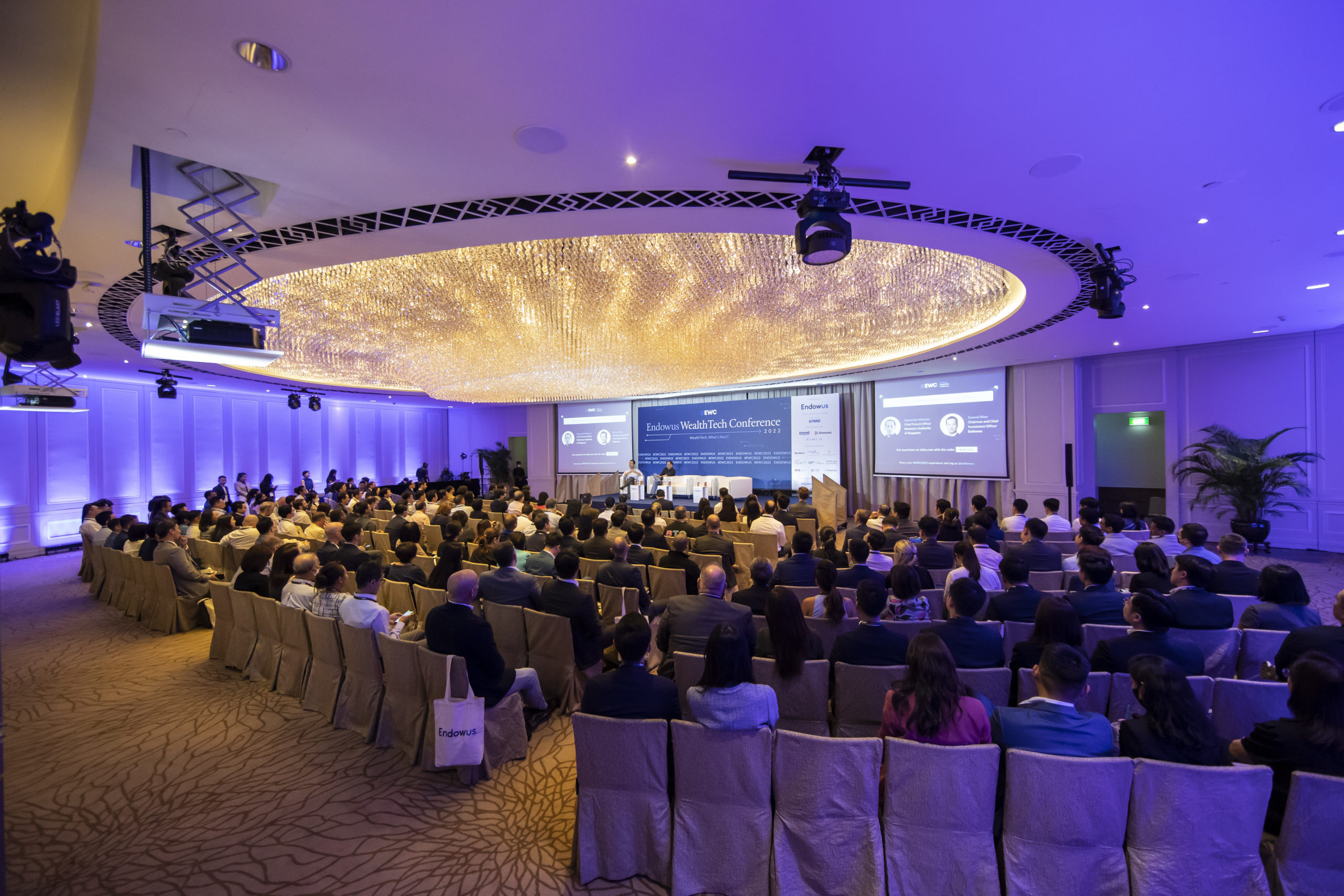Founded in 2017, Fintech startup Endowus is the first digital advisor in the region to span both private wealth and public pension savings, helping investors grow their money with financial advice and access to institutional solutions.
KrASIA chatted with Gregory Van, co-founder and CEO of Endowus, who believes that the adoption of digital wealth management is unstoppable.
This interview has been consolidated and edited for brevity and clarity.
KrASIA (Kr): Tell us about the idea behind Endowus.
Gregory Van (GV): We saw a big opportunity in developed Asia to digitize and improve the wealth management experience. This is to keep pace with the expectations of clients in terms of how they interact with digital services and the shift of traditionally offline services online.
Notably, as a fee-only wealth platform, we are trying to make this industry more transparent. We think this will lead to better outcomes for our clients by helping them make the right financial decisions.
Kr: Why did you decide to first launch Endowus in Singapore as opposed to Hong Kong where you’re originally from?
GV: Singapore is obviously a very attractive place to start, especially in terms of its regulatory framework as well as the country’s access to talent. Also, the idea came from the founders, comprising Singaporeans and expats, while we were based in Singapore, so it was a natural place to start.
Kr: What are some wealth management trends you’ve observed in Asia?
GV: Wealth management has historically been a behind-closed-doors kind of business. But this new generation of people who are earning money, the people who are saving up for their parents, children, and retirement, are more likely to make their own judgments on money matters, thanks to the Internet.
And because online platforms can systematically be more transparent, we believe that moving wealth online is an unstoppable trend. The trend is one-directional: more wealth will be moved online, and more advisory will be carried out online. As such, transparency is a key ingredient in building trust.
In some developed financial markets such as the US and the UK, getting sales commissions or trailer fees from fund managers is illegal. By contrast, in Asia, this mode is the primary way for fund distributors and financial services providers to get paid. They’re not only getting paid by the client but also from fund managers managing the products they’re selling. Financial services providers also get paid on a transactional basis. For example, they get paid sales charges, brokerage fees, etc. This is why we work hard to proliferate the fee-only wealth management movement, both online and offline.
Another trend we have observed is that the wealth business in Asia is the fastest growing in the world. Based on our wealthtech report with KPMG, there will be a burgeoning middle class and upper middle class, as well as an aspiring affluent class.
Yet the populations in countries in Asia such as Singapore and Hong Kong are aging quite rapidly, and they are underinvested. Amid inflation, if they do not invest and save properly, it will be very hard for them to maintain the quality of life that they’ve worked hard to achieve. So we think investor education and the adoption of investing is underpenetrated right now, and that needs to be improved.
Kr: What are some challenges that you’ve encountered in the wealth management space?
GV: Education, which is something we focus a lot on, is not something that will happen overnight. So a lot more education is needed and incepting the idea of investing for people has to happen. We’re at a very early stage of adoption.
Another is that there is a stigma around fintech that it’s trading and speculation orientated. Early wealth tech companies, crypto firms included, have been very focused on the ability to trade and speculate.
By contrast, Endowus is in the wealth management business, which is very different. For us, it’s about having your money in the right strategies that are appropriate for your goals, and those strategies should be focused on diversification to lower risk,lower costs, and increase returns. So making sure the client is compensated for the risk they take, and not from trading, speculation, or getting rich quickly.
Kr: In the wealth management segment, client acquisition can be quite costly. How do you manage such costs?
GV: While we have ongoing brand campaigns, many of our customers are actually referred by other clients, and they usually start their Endowus journey as a result of our educational content.
Endowus has probably one of the larger personal finance content hubs today in Singapore, where we are creating useful content for people to improve their personal wealth and finance journey. We would rather lead by education and build a trustworthy relationship with our clients, rather than just throw offers at them.

Kr: But educating clients can also be a costly process.
GV: We pay a lot of attention to the absolute cost of paying per customer and making sure that it’s not irrational.
To that end, we have our own internal matrix to monitor the cost we are paying in performance marketing and branding campaigns. While building the meaning and awareness of Endowus in the public eye, we need to ensure that all spending is tracked closely and ensure that it’s within a reasonable band.
Kr: Update us on your funding rounds.
GV: We are always looking at long-term funding partners. Endowus was actually self-funded by its employees from its inception until the beginning of 2021. We did not fundraise publicly until early 2021, where some external investors found us, liked what we were doing, and wanted to back us to grow faster. A number of them include UBS, a couple of VC funds, and Singtel and Samsung.
Laterin 2021, we raised again from EDBI as well as Prosus/Naspers. These investors take a very long-term view of the change that Endowus will be providing for the industry.
We will likely raise more rounds in the future but we’re not in the business of raising and spending a ton of money to show figures just to raise again, which is what we’ve seen in a lot of tech companies in the last cycle.
Kr: What are some new technological tools that you’ve developed at Endowus?
GV: We’re a wealth management company. Different firms approach this business in different ways. We believe that where we focus our technology should be on areas that are missing in the incumbent industries. We should be standing on the shoulders of the industry, taking the best of what they’ve made, digitizing that experience, and delivering it in the best way possible to the client.
One technology we’ve built, for example, when it comes to investing, is threshold-based rebalancing. This means we look at your portfolio, and whenever it swings too far away from your target risk allocation, we bring your portfolio back to its target risk. e’re monitoring hundreds of thousands of portfolios for our clients every day. It’s a kind of technology to use if you want to invest your Central Provident Fund (CPF) on a recurring basis, whereby we can set a recurring investment with your CPF money. With your permission, we will pull money out of your CPF and look at your portfolio, and we will allocate that new CPF money to the funds that are underweight.
Our take on technology is, however, not to manipulate investment products. Technology has been applied over the past five decades whereby the biggest computers in the world would end up in the financial industry trying to play the financial markets. And we’re not out to do that.
Kr: But there is still a number of people who distrust financial technology, including digital wealth management platforms.
GV: It’s a natural adoption curve. Wealth management, even more so than stock brokerage, is an opinionated business. And we are in the business of education, trust, delayed gratification, and long-term fulfillment. So there are no immediate results that the clients can rely on. That’s why building trust is so important.
I think we’re reaching the stage where a lot of things being online allows us to be systematically more transparent. As a result, people trust hitting buttons. Or if they need advice, they can call us. We’ve over ten MAS-licensed client advisors. And then with that knowledge, hit the buttons on their own and complete their transactions and create those portfolios toward their wealth goals.
I’d say we’re very early in this behavioral change. But I think it’s happening and only going in one direction.
Kr: What are some highlights from the recent report carried out in partnership with KPMG?
GV: The wealth business in Asia has seen the highest growth over the past five years, even though we’re behind Europe and the US. A major reason driving this growth is the increase in the high-networth population in this part of the world; we’re seeing new wealth and second-generation wealth transfer. All these factors contribute to the high growth trajectory of the wealth business in Asia.
Another highlight is that VC investment in Asian wealth tech firms has steadily risen over the past five years. Initially, the increase was in terms of deal sizes, which were at the early stage and seed level. Now we’re seeing more investments in Series A and B wealth tech firms.
Also, if you were to compare the venture funding of Singapore versus Asia, in Singapore alone, there is a seven-fold increase over the last five years as opposed to a two-fold increase in Asia as a region.
Kr: What are your plans moving forward?
GV: Endowus recently received approval from the Securities and Futures Commissions of Hong Kong to offer our wealth management platform and advisory services in the territory. So Hong Kong is definitely the next market for us, where we’ve just filled a new position to head the Hong Kong office.
Another thing we’re focused on is democratizing access to private equity, as well as the top hedge funds in the world. We’ll continue to develop our platform and onboard new investment options.

